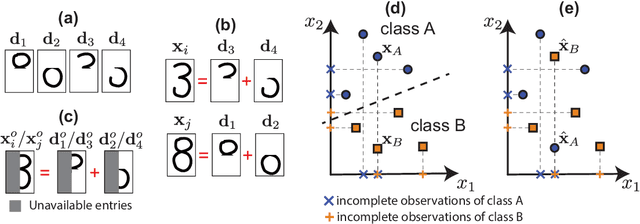Learning from Incomplete Data by Simultaneous Training of Neural Networks and Sparse Coding
Paper and Code
Nov 28, 2020



Handling correctly incomplete datasets in machine learning is a fundamental and classical challenge. In this paper, the problem of training a classifier on a dataset with missing features, and its application to a complete or incomplete test dataset, is addressed. A supervised learning method is developed to train a general classifier, such as a logistic regression or a deep neural network, using only a limited number of features per sample, while assuming sparse representations of data vectors on an unknown dictionary. The pattern of missing features is allowed to be different for each input data instance and can be either random or structured. The proposed method simultaneously learns the classifier, the dictionary and the corresponding sparse representation of each input data sample. A theoretical analysis is provided, comparing this method with the standard imputation approach, which consists of performing data completion followed by training the classifier with those reconstructions. Sufficient conditions are identified such that, if it is possible to train a classifier on incomplete observations so that their reconstructions are well separated by a hyperplane, then the same classifier also correctly separates the original (unobserved) data samples. Extensive simulation results on synthetic and well-known reference datasets are presented that validate our theoretical findings and demonstrate the effectiveness of the proposed method compared to traditional data imputation approaches and one state of the art algorithm.
 Add to Chrome
Add to Chrome Add to Firefox
Add to Firefox Add to Edge
Add to Edge